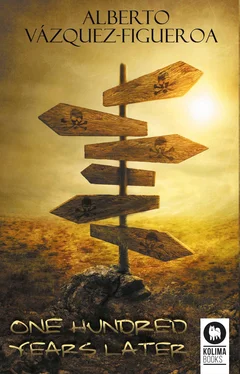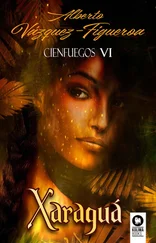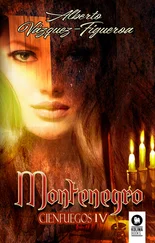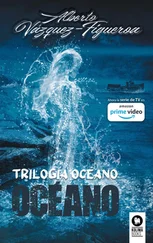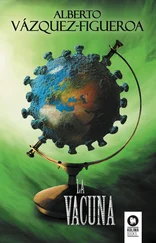“No.”
“Well, I think this might just be the right time to tell it.” He placed a pillow behind his back, knowing that what he was about to narrate would take some time. “I don’t know if you’re aware of this, but most lighthouses are automatic now, which means that the keepers’ only job is to check that they’re still running. Really, they’re more technicians than authentic lighthouse keepers. Anyway, there was a time when their work was almost considered a sort of priesthood, because for most there was no temple worthier of being preserved than that whose function was to safeguard human lives.”
“I’ve read something about that.”
“Automation saved money and had many benefits, but there were also many disadvantages. Sailors felt safer knowing that someone who was so dedicated to their work would be watching over them and answering all their calls. Nowadays they experiment something similar to what you feel when you dial a number to ask for help and get an answerphone at the other end.”
“I’ve felt that before.”
“But there’s a great difference when the person who calls is lost in the middle of a gale.”
“I guess there is.”
“Shut up or I’m not telling you more of the story.”
“Alright then, go on.”
“They say that nearly eighty years ago, a military patrol shipwrecked in the North Sea and three of its crew members, one of them a badly injured officer, were forced to spend several days in the tiniest rowboat. Finally, they reached an islet upon which rose a lighthouse where they found no humans nor food, nor any of the things that they needed so badly. There was only rain and wind and fog and a sea that rose again and again, claiming its preys. The tempest lasted too long, nobody in land could have ever imagined that they had survived and at last a month later a fishing boat rescued them.”
“Fuck!”
“Would you like me to wash your mouth?”
“I’m sorry. Continue.”
“The sailors confessed that they had eaten the body of the officer, who had ordered them in his deathbed to use his corpse so that he could continue protecting them from beyond.”
Aurelia opened her mouth as if to say something but changed her mind and closed it back again.
“Thanks, I like you better that way. So, what at the start was meant to be a discrete trial, became widely known due to contradictory conclusions that could be reached by looking at the events from different points of view. If it was proven that the sailors had killed the officer then they would have to be judged for murder and would face death penalty, whereas if the officer had died from his injuries and the survivors limited themselves to follow his orders by eating his body, which would have otherwise ended up as food for fish, the case would be seen with a very different light. So, they found themselves before a moral and legal dilemma: the judges had to determine whether as the prosecutor claimed, the accused deserved to be hanged and the poor officer was a victim; or, just as the legal attorney defended, these men were just the subordinates of a heroic soldier who deserved to receive medals for his astounding ability to sacrifice himself for others.”
“I would have believed the sailors.”
“But you weren’t there and you aren’t the one to judge.”
“That’s also true. What did they decide?”
“There’s more still; the wife of the deceased wished to meet the accused with the intention of reaching her own conclusions, as she considered that after fifteen years of marriage she was the best person to ascertain whether what these men said that her husband had done fitted the truth of his character. They spoke long and when it was all said and they asked the widow for her opinion, she replied that she wasn’t the right person to judge.”
“That doesn’t make any sense to me. If she knew something she should have said so.”
“When you think you know something but you’re not sure, the most logical and rational thing to do is to step aside. No doubt, that poor woman did not wish to feel guilty for the execution of two innocent people, but she also didn’t want to be the one to free two murderers.”
“When you put it that way…”
“That’s how she must have seen it. The votes remained divided and the positions irreconcilable, so they reached a decision: God was the only judge capable of dictating such a sentence so it would have to be Him who had the last word.”
“And? What did God say?”
“God never says anything, honey, but in case of doubt, the law says the sentence has to go in favor of the prisoners, however serious the crimes may be.”
“Did they free them?”
“I don’t know what happened after.”
“What? Then your story sucks!”
“I don’t want you to think that this is a story in which nobody knows the ending; you must think of it as a closed fan that looks black and white or blue and red, but firm and compact, and that as you unfold it, it forces you to change your mind. It takes you here and there and you end up swearing that it’s yellow or green, although in the end you discover that what you’re looking at is a sunset in Acapulco.”
“All that is great as a metaphor, but I would have liked it better if they’d been freed.”
“Me too.”
“And how has that story got anything to do with us?”
“It’s got a lot to do with us because we too haven’t got a choice.”
Aurelia felt grateful to her uncle for having saved her from an evening of crying that she would have later regretted, and spent the next hours just staring at the ceiling and wondering if she would ever eat another human even when not doing so meant that she would die.
These thoughts were not comforting, but in the light of current events, she needed to reflect. She thought cannibalism was abominable, but the murder in cold blood of a pregnant woman seemed worse, and there was only one thing that both actions shared: survival at all costs.
Was there anything as important as survival?
Конец ознакомительного фрагмента.
Текст предоставлен ООО «ЛитРес».
Прочитайте эту книгу целиком, купив полную легальную версию на ЛитРес.
Безопасно оплатить книгу можно банковской картой Visa, MasterCard, Maestro, со счета мобильного телефона, с платежного терминала, в салоне МТС или Связной, через PayPal, WebMoney, Яндекс.Деньги, QIWI Кошелек, бонусными картами или другим удобным Вам способом.
